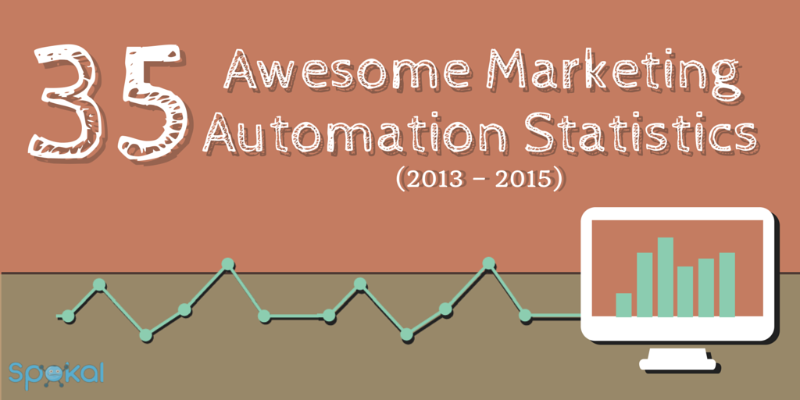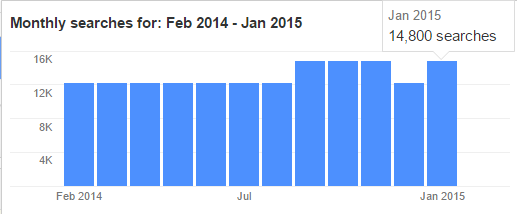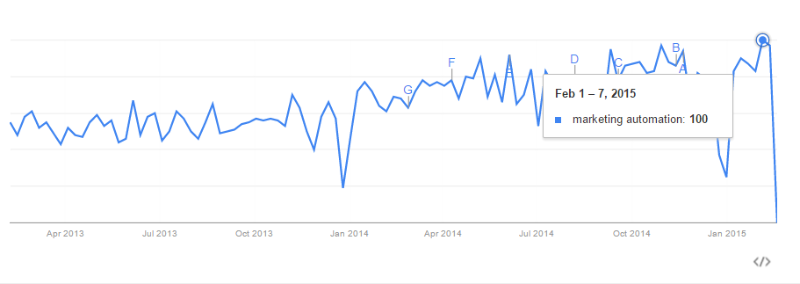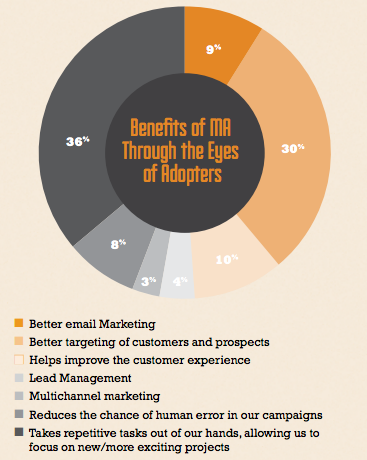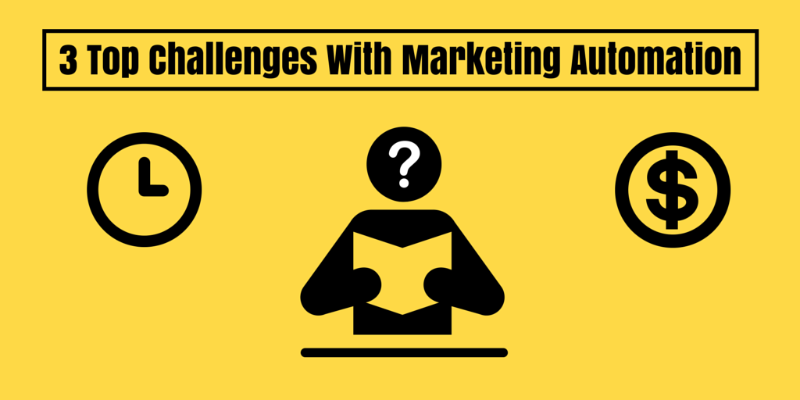It nurtures leads, entertains followers, tracks your customers, reduces human error and streamlines repetitive tasks so that you can spend your time doing something more productive… marketing automation seems like a no-brainer for businesses looking to get online!
But the reality is that it’s been slow to catch on.
Whether that’s because of a lack of education, priorities lying somewhere else, or a complete misunderstanding as to what marketing automation is and what it can do for your business, there’s one thing that’s undeniable: It works.And the marketing automation statistics speak for themselves.
But why have I only cited marketing automation statistics between 2013 and 2015?
Did you know that 35% of a businesses data becomes obsolete after a year? And they say that statistics as it relates to the internet become outdated after about 2 years or so because, as we all know, the internet is growing rapidly all the time. And while older statistics can be still useful, they have to be taken with a pinch of salt – and there’s only so much salt you can add before your cholesterol starts to spike.
So, in the interest of your health, I didn’t want to bog you down with anything that might be irrelevant.
The Growth of the Marketing Automation Industry
- There are 202 different marketing automation solutions on the market today – a 4% decrease from this time last year (Capterra)
- Monthly Google searches for the term “marketing automation” have grown by 22% in the past year, from an average of 12,100 in February 2014, to 14,800 in January 2015. (Google Keyword Planner)
- Google Trends shows that “marketing automation” is trending at is highest in 2 years.
- There were nearly 11 times more B2B organizations using marketing automation as of August 2014 than there was in 2011. (Sirius Decisions, 2014)
- 63% of companies are substantially increasing their marketing automation budget in 2015 (Salesforce, 2015)
- Marketing automation has seen the fastest growth of any CRM-related segment in the last 5 years.(Focus Research via Hubspot)
- 22% of B2B companies considered marketing automation as one of their top priorities in 2014. (Adobe, 2014)
Conclusion:
These marketing automation statistics show that the industry is growing steadily, and it doesn’t seem to be slowing down any time soon. Companies are beginning to consider it a top priority.
Who’s Using Marketing Automation?
- Marketing automation adoption is tied to company size. 76% of those who use marketing automation are from larger companies with over 100 employees, 26% are mid-sized companies with 10 – 100 employees and 18% are small companies with under 10 employees. (Buyer Zone, 2013)
- Only about 4% of businesses in the U.S. with 20 or more employees are using marketing automation software. (VentureBeat, 2014)
- Overall, only 22% of companies are using marketing automation software today. (Salesforce, 2015)
- The 5 industries with the highest marketing automation adoption rates are Software & Internet, Telecommunications, Computer & Electronics, Health & Pharma and Business Services (Mintigo, 2014)
- Marketing automation software only has a 3% adoption in non-tech companies.(VentureBeat, 2014)
- Best-in-class companies (companies who are performing at the highest performance level in their particular industry) are 67% more likely to use a marketing automation platform. (Aberdeen Group, 2014)
- 53% of B2B Fortune 500 companies use marketing automation – a 112% increase from 2013 (ClickZ, 2014)
- 76% of SaaS companies are using marketing automation. (Pardot, 2013)
- 16% of North American B2B companies use marketing automation technology (Sirius Decisions via AdAge)
- 91% of buyers in 2013 were evaluating marketing automation for the first time. (Software Advice, 2014)
Conclusion:
These marketing automation statistics indicate that the smaller the company is, the less likely they are to adopt marketing automation. The more successful and bigger the business, the more likely they are to adopt marketing automation software earlier on.
This could be because the idea that marketing automation is expensive, and thus small businesses think that they can’t afford it. It could also be because small businesses have yet to learn the value of marketing automation!
Any theories? Share them below!
How Effective is Marketing Automation?
- Marketers that have adopted marketing automation technology say the main benefits are:
- 75% of companies who use marketing automation see ROI after 12 months, 44% after 6 months. (Focus Research, 2013, via Salesforce)
- 67% of marketing automation-users listed the technology as “very effective/effective. (Salesforce, 2015)
- 63% of companies growing faster than their competition use marketing automation (The Lenskold Group, 2013)
- 78% of high-performing marketers say that marketing automation software is responsible for improving revenue. (The Lenskold Group, 2013)
- 8% of B2C and 21% of B2B marketers find marketing automation one of their top digital priorities. (Adobe, 2014)
- Companies that use marketing automation software average 4,200 leads per month, twice the amount of companies who just use email software. (Autopilot, 2015)
- Companies that use marketing automation software have over 650,000 contacts in their marketing database, 30% more than those who don’t. (Autopilot, 2015)
- Companies that use marketing automation are 3x more likely than companies without automation to track and attribute their content-marketing efforts to multiple touchpoints (36% to 11%). (The Lenskold Group, 2013)
- Relevant emails delivered through marketing automation receive 18 times more revenue than email blasts (Jupiter Research via Salesforce)
- Companies that invest in marketing automation solutions see 70% faster sales cycle times, and 54% improvement in quota achievement. (Bulldog Solutions, 2013 via Salesforce)
Conclusion:
Companies that use marketing automation see better results than those who don’t – simple!
Challenges With Marketing Automation
Like with any new technology, marketing automation comes with its own sets of challenges. Often, this is due to a lack of education beforebuying a product, a lack of training, or the wrong product for the wrong company.
- 44% of marketers are not fully satisfied with their marketing automation systems. (Autopilot, 2015)
- The top 3 reasons that marketers are not happy with their marketing automation systems is that they take too long to implement, they’re difficult to learn and they’re expensive. (Autopilot, 2015)
- 38% of marketing automation users were actively considering switching marketing automation systems in the coming year. (Venture Beat, 2014)
- The top concerns about implementing the new marketing automation technology are budget constraints, siloed organizations, and poor data quality. Nearly one in four respondents found marketing automation systems too complex to be used effectively. (B2BOnline, 2013)
- The top criteria that would encourage people to use marketing automation are “very low cost” (46%) and ease of use (39%), followed by access to analytics and insights capabilities.
- 64% of CMOs have either an informal or no process to manage their marketing automation. (The Annuitas Group via Market Bridge)
- Nearly 2/3 of B2B marketers identified engaging key decision makers as their top challenge. (Forrester Research via Hubspot)
- 18% of marketers said that they used marketing automation extensively, while 43% made limited use of it, and 39% didn’t use at all (Ascend2 via Customer Experience Matrix, 2013)
Conclusion:
Companies aren’t quite fully on-board with marketing automation. They’re often choosing the wrong software, under-utilizing it, or not providing enough resources for it to be effective. Marketing automation is often still seen as too expensive (ahem, Spokal’s not…!) and difficult to implement (ahem… hello no mandatory training with Spokal).
Sorry to shamelessly plug, but the reality is that there are a ton of great marketing automation software’s on the market now, and all you have to do is find the right one for your budget, resources and business.
Want to start know about the marketing automation options out there that would be best for your business and your goals, but not sure where to start? Just answer a few question in this post and we’ll give you the direction you need!
Liked these marketing automation statistics? Let us know in the comments below!
Need help with your inbound marketing?
 That's what we're here for. We've guides, templates and even a dictionary that will get your inbound marketing fight-fit in no time. Oh, and of course, we'll send you a ton of tips and tricks that will be sure to help you out too!
That's what we're here for. We've guides, templates and even a dictionary that will get your inbound marketing fight-fit in no time. Oh, and of course, we'll send you a ton of tips and tricks that will be sure to help you out too!
